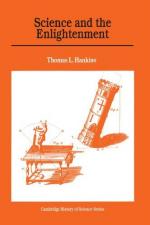
|
| Name: _________________________ | Period: ___________________ |
This quiz consists of 5 multiple choice and 5 short answer questions through Chapter 4, Chemistry.
Multiple Choice Questions
1. The concept of subtle fluids made its appearance around ________ when demonstration experiments in physics were rapidly gaining in popularity, according to the narrator in Chapter 3.
(a) 1740.
(b) 1853.
(c) 1770.
(d) 1800.
2. Some of the "cabinet de physique" became very large, the most famous being the collection of the ________ in Haarlem.
(a) Rockefeller Foundation.
(b) Robert Wood Johnson Foundation.
(c) Teyler Foundation.
(d) Ford Foundation.
3. What was the name of the revolution that was a cultural event associated with Galileo Galilei, Johannes Kepler, Rene Descartes, and Isaac Newton?
(a) American Revolution.
(b) Enlightenment Revolution.
(c) French Revolution.
(d) Scientific Revolution.
4. In 1660, Robert Boyle published an account of experiments that he had performed with his ________, according to the narrator in Chapter 4.
(a) Forceps.
(b) Microscope.
(c) Vacuum pump.
(d) Filter.
5. Newton had not made it clear whether the forces acting between the planets and between the parts of matter acted at a distance or through some intervening medium called a(n) ________.
(a) Witness.
(b) Fluid.
(c) Ether.
(d) Osmosis.
Short Answer Questions
1. All of the following philosophers at the University of Leiden followed Newton's lead in organizing experiments except for whom?
2. According to the narrator in Chapter 3, Abbe Nollet, who became the most prominent ________ during the Enlightenment, explained the two electricities as opposing currents of the electrical fluid emerging in jets from the electrified body.
3. Symmer's socks suggested the presence of ________ electrical fluids, according to the narrator in Chapter 3.
4. Descartes's "quantity of motion" is equivalent to our modern principle of the conservation of ________.
5. In Chapter 3, who proposed a single static electrical "atmosphere" that attracted and repelled by pressure rather than by the impact of an electrical wind?
|
This section contains 270 words (approx. 1 page at 300 words per page) |

|




